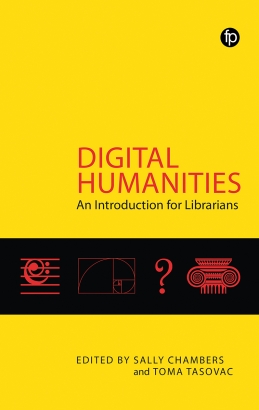
Primary tabs
You don't need to be an ALA Member to purchase from the ALA Store, but you'll be asked to create an online account/profile during checkout to proceed. This Web Account is for both Members and non-Members. Note that your ALA Member discount will be applied at the final step of the checkout process.
If you are Tax-Exempt, please verify that your account is currently set up as exempt before placing your order, as our new fulfillment center will need current documentation. Learn how to verify here.
- Description
- Table of Contents
- About the authors
Digital Humanities is thriving, and the essential role that libraries, archives and museums play in digital humanities initiatives is increasingly being recognized. This primer provides practical advice for embedding digital humanities activities into daily operations of cultural heritage institutions, and inspiration for library and cultural heritage professionals wanting to actively engage with the digital humanities community. Which approaches have led to successful partnerships and collaboration with digital humanities researchers, and how to provide best access to digital collections, are among the questions readers can find answers to in this book. Content covered includes:
- insights from humanities researchers working with digital methods across a range of disciplines including tips and tricks for successful collaborations with libraries and other cultural heritage institutions;
- the opportunities and challenges of providing access to digital cultural heritage collections including case studies from key initiatives such as the Collections as Data and GLAM Labs movements;
- key tools and methods used by the digital humanities community including text and data mining, social network analysis, and spatial humanities;
- a range of organizational considerations for library managers wishing to strategically embed digital humanities support into the daily work of the library; and
- how emerging technologies such as artificial intelligence and machine learning can help libraries stay ahead of the game.
Foreword
Introduction
1. Setting the digital humanities context: a brief history to digital humanities and the role of libraries
2. Digital scholarship in the humanities: insights from the disciplines
3. Scholarly methods in the digital humanities
4. Getting DiRTy with Research Tools: a Guide for Librarians
5. Digital scholarship in the humanities: an overview of tools and methods
6. Digital humanities and the library: key initiatives
7. Digital humanities and the library: key initiatives
8. Getting involved: opportunities for librarians
Index
Sally Chambers
Sally Chambers is Digital Humanities Research Coordinator, Ghent Centre for Digital Humanities, UK.
Toma Tasovac
Toma Tasovac is Director of the Belgrade Center for Digital Humanities (BCDH) and Director of the pan-European Digital Research Infrastructure for the Arts and Humanities (DARIAH). With an academic background in Comparative Literature and degrees from Harvard, Princeton and Trinity College Dublin, Toma's areas of scholarly expertise include historical and electronic lexicography, data modeling, digital editions and research infrastructures. He is the co-creator of TEI Lex-0: a baseline encoding format for lexicographic data, which was awarded the 2020 Rahtz Prize for TEI Ingenuity by the TEI Consortium. He has served on a number of major international committees such as the European Research Council (ERC), Europeana Research and JPI Cultural Heritage, and he has played a leadership role in numerous DH projects funded by national and international agencies, including Erasmus+, Horizon 2020 and the National Endowment for the Humanities.


